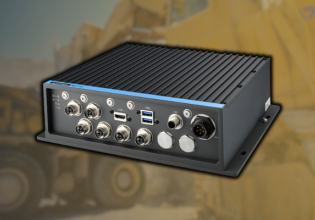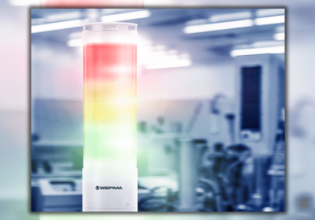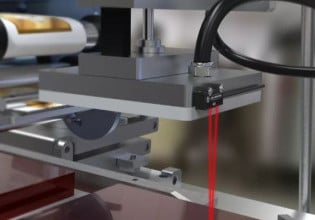Tips for Selecting a Warehouse Control System (WCS)
Learn about the specific considerations to make when selecting the appropriate warehouse control system for your automation process.
A warehouse control system (WCS) is a software solution operating under the warehouse management system (WMS) umbrella to manage and control industrial equipment. This includes controlling and handling materials such as conveyors and carousels. A WMS does not contain a WCS. To fully benefit from having both a WCS and a WMS, they must be separately purchased and acquired.

An automated machine moving through a warehouse utilizing WCS software to complete the task.
When selecting a WCS for a WMS, there are many options in the market. Each has its functions, features, and benefits. However, selecting a system that best fits your specific facility requires thorough examination.
Considerations for Selecting a Warehouse Control System
It's important to set clear goals when investing in software systems for your warehouse control system. This article will examine the important steps in selecting the appropriate system for your warehouse based on your specific needs.
One-time Investment
Unlike computer hardware or other consumables, software purchases are typically a one-time investment. The price of this proprietary software can be high, depending on the size of the company and the type of investment they're making.
If the selected WCS fails to deliver its goals, it's not easy to discard the entire WCS and opt for another WCS.
Licensing Requirements
In addition to software, the company purchasing the WCS is also typically required to purchase a license for utilizing the software. The license fees can increase with additional modules or functions.
In many cases, the licensing fees paid are not transferable or are refundable. This is why a company must think critically before committing to a specific warehouse control system. In addition to thinking critically about the licensing and investment, there's a lot to consider about who will maintain and manage this WCS, as it requires specific technical expertise.
Technical Expert Requirements
When a company purchases a new software, they will usually hire or train a team of experts to manage and maintain the software. These experts are often control systems engineers who get training from the developer at the time of software commissioning.

Two engineers working to control the WCS software within the facility.
This training is important because each WCS software will be specific to the company and systems it's working with.
Selection Criteria for Warehouse Control System
Warehouse control systems come as a software package with the WMS purchased separately. The buyer is not usually obliged to acquire a WCS from the same developer that supplied the WMS. Any developer's WCS, as long as it fulfills the buyer's requirement, can be acquired and can be successfully implemented on its own.
Let's look at some critical things to consider before selecting a warehouse control system to make the investment worthwhile.
Integration with the Existing WMS
A warehouse control system is not an independent system, nor is it designed to act as an alternative to the existing warehouse management system. The WCS operates under the supervision of WMS and takes instructions from the WMS for equipment movement and monitoring. The equipment tracking also rationalizes stock and inventory monitoring effectively and accurately.

Some modern warehouse automation technologies such as robots and automated storage and retrieval systems working with the WCS software to fulfill orders.
The selected WCS should be able to integrate within an existing WMS without requiring many changes. The WCS should not limit any WMS function.
Real-time Monitoring in Warehouse Automation
A WCS is capable of monitoring and controlling equipment moving in a real-time manner. It provides real-time information about the equipment's status and controls material flow throughout the warehouse.
A WCS requires hardware and software resources to execute real-time monitoring. Added investments such as increased financial cost, personnel expertise, and hardware maintenance cannot be compromised and neglected.
When selecting a WCS, it is advantageous to consider your requirements. You'll need to determine some specifics, such as the scale of warehouse operations and if the goods are critical enough.
What Does the WCS Control?
The WCS controls all the material handling equipment in a warehouse and can control every piece of equipment. The company that purchased the WCS selects the equipment type for its warehouse, and the developer integrates particular equipment into its WCS.
The equipment selected depends on the buyer's requirement and available resources. Factors such as available space, product type, and operation speed are essential to determine before WCS selection. In addition, the company that purchased the WCS must have support from the developer.
Developer Support
It is common for the software systems within a WCS to have issues and bugs that often require developer support. During commissioning, the developer usually provides the buyers with personnel training and routine maintenance to overcome any operational errors. Sometimes problems arise that only the developer can solve. Another area where the developer support is critical is when WCS needs security updates to the software to avoid a data breach.

Boxes moving through an industrial warehouse on a conveyor belt.
The developer must be timely available to resolve these issues as they happen. Most warehouses operate 24 hours a day, so developer availability at all-time must be ensured and committed at the initial stages of procurement.
In summary, there are many things to consider when selecting a warehouse control system. The buyer must consider several different developers and select which software is best suited for their specific processes.
Have you integrated a warehouse control system into your facility? If so, what factors did you need to consider?






